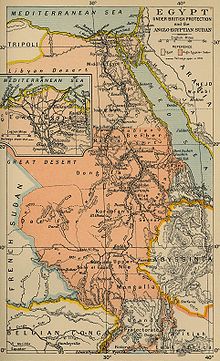British rule in Egypt

The British rule in Egypt lasted from 1882 until the formal independence of the country as a Kingdom of Egypt in 1922. However, the British influence on the country remained up considerably in the 1950s.
prehistory
Under Muhammad Ali Pasha (1805–1849), Egypt achieved relative independence from the Ottoman Empire . He and his successors as Khedive were able to achieve a certain degree of independence under Ottoman rule, pursued an expansive policy and initiated the history of modern Egypt. The construction of the Suez Canal (1859–1869) made the country so dependent on foreign loans that the national debt administration established by Great Britain and France became the actual government of the country. Great Britain acquired the Egyptian canal shares to secure the connection route to India. The nationalist Urabi movement developed in 1881 against the international financial control of the country, which was imposed on the Khedive Ismail Pasha, who was deposed in 1879 . This turned against the dominant European influence and the autocratic government of the Khedives. Ismail's son and successor Tawfiq therefore turned to Great Britain .
British rule in Egypt
During the Anglo-Egyptian War in 1882, the country was occupied by British troops under Garnet Joseph Wolseley in the course of crushing the Urabi movement . On September 13, 1882, Ahmed Urabi Pasha was defeated in the battle of Tel-el-Kebir . Great Britain took control of the country without ending its formal assignment to the Ottoman Empire . The Khedive of Egypt remained formally a vassal of the Ottomans. British rule was represented by the Consul General , who, as an advisor to the Khedive, was the actual ruler of the country.
From 1883 to 1907 the office of consul general was exercised by Evelyn Baring, 1st Earl of Cromer . Under him, Egypt was economically integrated into the British Empire and subordinated to its interests. So agriculture was converted to the cultivation of cotton . Soon, cotton represented 92% of Egyptian exports. In addition to the expansion of large estates, this meant that Egypt, as a traditional grain exporting country, now had to import grain in order to be able to feed its population. The Egyptian army had British generals as commander-in-chief ( sirdar ) from 1883 and was trained and led by British officers.
Simultaneously with the British occupation, Egypt had also lost control of Sudan in 1882 through the Mahdi uprising . In 1896 an Anglo-Egyptian force marched to retake the country. After the Battle of Omdurman, Sudan was not returned to Egypt, but instead constituted as an Anglo-Egyptian condominium . This condominium existed from 1899 to 1956.
In the First World War was Sinai as border area to Ottoman Palestine until 1917 combat zone . After Great Britain declared war on the Ottoman Empire in November 1914, the Khedive Abbas II was declared deposed and Hussein Kamil with the title of sultan was installed as ruler of Egypt in his place . The resulting Sultanate of Egypt was declared a British Protectorate on December 18, 1914 , with the result that the last formal ties to the Ottoman Empire were terminated. Instead of the consul general, a British high commissioner took over the administrative tasks. As a result, the British enforced the war economy , which led to a far-reaching impoverishment of the population, as the purchasing power of the British and Empire troops stationed in Egypt increased food prices sharply, but on the other hand, cotton prices were sharply reduced under British pressure.
When the British prevented a delegation of Egyptian nationalists under Saad Zaghlul ( Wafd party ) to the Paris Peace Conference in 1919 , there were serious unrest, strikes and a boycott of British products. Under this pressure, High Commissioner Allenby pushed through to grant Egypt independence in order to continue to protect British interests. The country formally gained independence on February 28, 1922 in the Declaration to Egypt , but the British retained some rights. On March 15, 1922, the previous sultan proclaimed himself king as Fuad I. The Kingdom of Egypt succeeded British rule.
Through the alliance treaty of August 26, 1936, Great Britain waived certain rights of reservation in Egypt and withdrew its troops to the Suez Canal zone, whereby it secured the right of access to the Egyptian transport and communication system in the event of war. The office of Sirdar of Egypt was abolished.
During the Second World War , Great Britain relied on the Anglo-Egyptian Treaty of 1936, regardless of an Egyptian declaration of neutrality , which allowed the occupation of the country if the Suez Canal were threatened. The north-west of Egypt became the battlefield for German and Italian troops under Erwin Rommel and the British under Bernard Montgomery . The Egyptian army itself remained neutral.
It was not until 1946 that the last British troops left the country. In the Suez Crisis of 1956, Egypt was completely freed from the British sphere of influence .
See also
literature
- Afaf Lutfi al-Sayyid: Egypt and Cromer. A Study in Anglo-Egyptian Relations. John Murray Publishers, London 1968.
- Robert L. Tignor: Modernization and British Colonial Rule in Egypt, 1882-1914. Princeton University Press, Princeton NJ 1966.
Individual evidence
- ^ Vernon A. O'Rourke: The British Position in Egypt. In: Foreign Affairs. P. 698 , accessed on February 27, 2011 (English).

